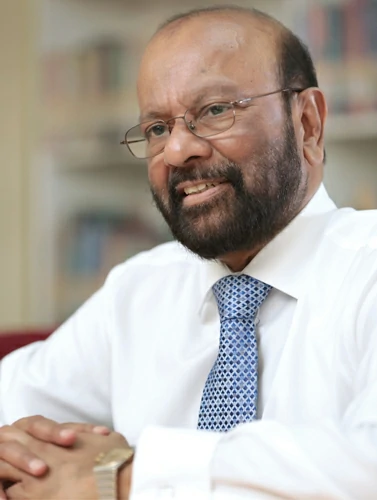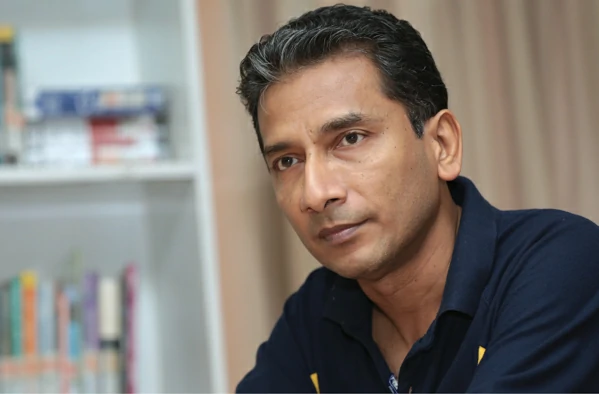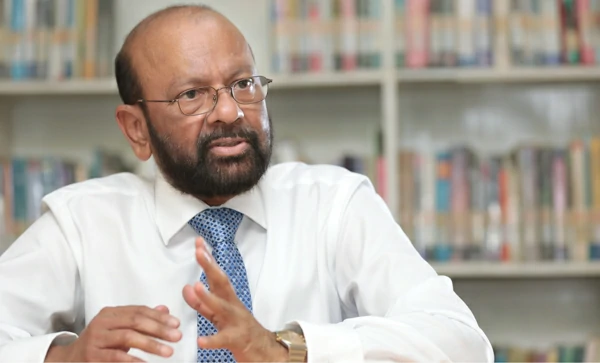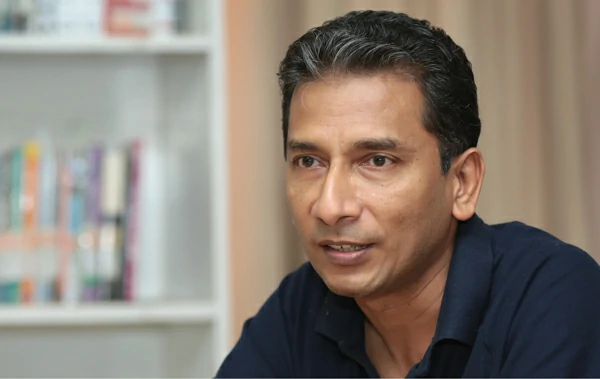
Working towards export earnings of one billion dollars in 2016, Sri Lanka’s Information Technology and Business Process Management sector is fast becoming the largest contributor from the country’s export portfolio. This growth is positively correlated with the quality of human resources, something the Informatics Institute of Technology (IIT), Sri Lanka’s pioneering private education institute, has been providing for 26 years. Dr Gamini Wickramasinghe, Founder Chairman of the Informatics Group and Dr Ruvan Weerasinghe, Dean of IIT speak about meeting industry requirements and nurturing globally employable graduates.
By Keshini de Silva | Photography Menaka Aravinda and Isuru Upeksha
IIT was the first British higher education institute in Sri Lanka. Tell us about the Institute’s journey?
Gamini Wickramasinghe (GW): The journey started in 1990. This was after the establishment of Informatics, a software and systems integration company, in 1983. However, we found it was difficult to find qualified people to effectively conduct our operations, especially in software. There was a skills gap for qualified personnel across the industry.
Our national universities were producing a few graduates in computer science, computer systems or data processing. The University of Moratuwa was producing students in the field of electronics, however we needed computing people. This lacuna in the industry was one of the main reasons behind setting up IIT.
After setting up IIT a need for supply chain management emerged and we understood that through research Sri Lanka needed human resources for the computer and software industry. Our desire was to develop software personnel for our market in Sri Lanka.
Our goal was to offer a globally recognised British qualification. The founding team had been educated in England and had even worked in that part of the world. I felt it was the best opportunity to introduce British higher education to the country, especially because at that time England was the first choice for Sri Lankans with aspirations to study overseas. Travelling to USA and Australia for higher education came afterwards.
Initially we tied up with Manchester Metropolitan University to offer Undergraduate programmes in information systems and computer science. We gradually moved on to offer postgraduate qualifications. Throughout our journey most of our academics and educators have been British educated.
What are the programmes offered at IIT and what pathways do you offer students seeking to further their studies, especially overseas?
GW: Initially we offered the Bachelor of Science in Engineering (BSc) in Computer Science and Computer Systems from the Manchester Metropolitan University. We also offered a BSc in Information Systems, which 20 years ago was called Business Information Systems. The two faculties were led by Heads from the UK. Expanding to the business side of things we tied up with the University of Westminster to offer ISBM or Information Systems Business Management. IIT was in an area of IT that was correlated with business; therefore we needed to combine IT and Business. Accordingly, we will be offering other related programmes too.
An emerging topic in IT today is Big Data Analytics. We recently launched the MSc in Big Data from the Robert Gordon University, which commences in September this year. Robert Gordon is one of the top universities in the UK, scoring high points in the area of producing graduates that are highly employable. Big data is a big requirement in today’s software sector. A majority of Sri Lanka’s IT companies are involved in it. It’s an opportune time for us to launch this programme, because now Sri Lankans will not need to go overseas if they wish to pursue studies in this area. Currently the programme is offered Part Time, providing students the opportunity to work while studying. If there is a demand for it we are prepared to launch a Full Time programme as well.
We are also expanding our business curriculum. We now offer an MBA from the Canterbury Christ Church University and are in the process of including additional special business degrees with the University of Westminster.
An Emerging Topic In IT Today Is Big Data Analytics. We Recently Launched The MSc In Big Data From The Robert Gordon University, Which Commences In September This Year.
IIT has also partnered with Deakin University in Australia, a programme for which we will be enrolling a new intake this month. The Bachelors Degree follows the One plus Two concept, where the first year of study will be conducted in Sri Lanka while the additional two years will be in Australia.
Although our Bachelors and Masters Programmes are delivered locally, students have the option of transferring the remainder of their studies to any University in the UK.
What practical exposure do you offer your students?
Ruvan Weerasinghe (RW): The hallmark of IIT is the one-year internship. During this period students begin the practical application of their knowledge as well as research. After being exposed to the real life scenarios of the industry they are inspired with interesting ideas and create novel products. Fueled with this inspiration they come back to their final year with innovative ideas for their final project. In fact we hosted our annual exhibition Cutting Edge just last month. The exhibition has received very good recognition while even examiners from Westminster University were amazed by the standard of the student projects.
The IT industry is a fast changing sector. How do you ensure your graduates have practical knowledge and are globally employable?
GW: From the inception of IIT we have produced qualified and employable graduates. 30 per cent or even a higher percentage of our graduates were employed overseas. They worked in reputed organisations such as IBM and Cisco. From the late 90s till the 2000s there was a technology bubble. As a result, heading into the new millennium there was a demand for IT personnel in different specialisations. And Sri Lankan IT graduates were able to secure employment in the UK, US or Australia rather than just the Middle East as in preceding years before the tech bubble.
Today the trend continues. Most of our graduates are not only employed overseas, but they also pursue their postgraduate studies, including reading for their PhDs at reputed universities in the US, UK and Australia. Not only do our students work in the field, but they also pursue careers in academia becoming professors and senior lecturers in the academic world. In Sri Lanka, many who hold management positions in reputed organisations and those operating their own companies are IIT alumni.
Our Graduates Hold Senior Management And Engineering Positions In Companies Such As Virtusa, Zone24x7, WSO2, Intel Corporation, Millennium IT, IFS, Google And Creative Solutions.
The most important thing that we give our students is confidence. Through industry exposure, our exhibitions and by even providing them the resources to enter international-level competitions our students learn to have confidence in their skills. As a result they shine when they walk into job interviews and start their corporate journey.
RW: Our programmes and course modules include guest lectures by industry practitioners, who are industry leaders. These lecturers present a workshop or lesson linked to the subject area from an industry point of view. It’s called our guest lecture series. This includes a guest lecture series on latest industry related trends and practices. The lectures really help our students relate their academic learning to a practical scenario. By being exposed to the latest trends in the ever-changing industry, they are kept abreast on the changes in the IT sector.
IIT has been in the education industry for over two decades. Could you tell us about your students and alumni?
GW: Yes, IIT just celebrated 25 years last year and in 2016 we entered our 26th year. To date we have produced 3,000 plus alumni.
In addition to students graduating with a First Class or Second Class degree, the top-performing student of the class is awarded the Gold Medalist title. If you look at the industry today, these high performers have really shined.
40 – 50 per cent of our graduates hold senior management and engineering positions in companies such as Virtusa, Zone24x7, WSO2, Intel Corporation, Millennium IT, IFS, Google and Creative Solutions. While several start-ups are mushrooming in Sri Lanka, many of these are led by IIT graduates.
In addition 70 per cent of our graduates have foreign exposure or experience working for foreign software companies based in Sri Lanka. Over the years we have seen a trend of many IT graduates gaining international exposure and then returning to Sri Lanka, which is a good sign for the country.
During their time at IIT, students are urged to innovate and participate in international and national level competitions. Over the years our students have claimed accolades at Microsoft Imagine Cup, Google Summer of Code (GSoC), the National Best Quality Software Awards (NBQSA) organised by the British Computer Society and also the HSBC Youth Enterprise Award. At last year’s Microsoft Imagine Cup, seven teams from IIT claimed six medals in the categories games, innovation and world citizenship. Competing against other international and national institutions, our students win and these achievements add to the value of the Institute.
These success are not limited to academics as we encourage our students to take part in sport, drama and arts among extra-curricular activities. We try our best to give our students a well-rounded education. Even at our annual exhibition Cutting Edge, the projects students put forward are sponsored by organisations. We encourage this and try to highlight their achievements setting a platform from which they launch their professional career. And through Stage Craft we help them embrace creativity in other aspects such as the performance arts.
RW: I believe our placement programme really helps students. We work very closely with the industry. Therefore, we don’t just hand our students an academic qualification, their training at IIT is linked to the industry. Students know what to expect in the corporate world as they have already had a taste of what is to be expected. This gives them much-needed confidence at the beginning of their careers.
As an institute established in the ‘90s, could you tell us about the changes you have seen in Sri Lanka’s education sector?
GW: Yes. IIT was the first Sri Lankan institute to deliver British Higher Education qualifications in the country. To mark our 25th anniversary the British High Commission hosted us to a reception. This included our alumni, industry participants and well wishers.
Today Australian and US qualifications are also offered in Sri Lanka. However, when we started 90 per cent of tertiary education was delivered through national universities. This included institutes such as NIBM and the Open University of Sri Lanka, which were still in the inception phase at the time.
The biggest change has been the proliferation of private education institutions delivering international programmes and hopefully maintaining high standards
Students Know What To Expect In The Corporate World As They Have Already Had A Taste Of What Is To Be Expected. This Gives Them Much-Needed Confidence At The Beginning Of Their Careers.
You would not see IIT in the newspapers every week. We are not competing for numbers. We look into the quality of the product. Although there is a demand, we are constrained in taking in higher numbers due to the limitation of the premises. However, we will be physically expanding the Institute and plans are afoot.
RW: IIT is not really about the numbers but about the quality. And that distinguishes IIT from the rest.
What role does private education play in Sri Lanka and how important is it?
GW: National universities are only able to absorb a limited percentage of the students who qualify through their Advanced Level Examinations. In addition to catering to this Higher Education gap, private education is also important as these institutes cater to the specific demands of the job market. Be it Accounting or IT, private education institutes do not only produce graduate numbers that national universities are unable to cater to. They also nurture graduates in specialised areas, which is a market demand national universities are unable to meet.
Private institutes also help Sri Lanka retain its Foreign Exchange. By providing international education in Sri Lanka, these institutes ensure students do not need to needlessly travel overseas to study, which is in fact quite an expensive move in terms of high fees and living costs. The country can reduce a considerable number of foreign exchange that leaves the country by promoting the establishment of private higher education bodies in Sri Lanka. If students want they can travel overseas quite easily for postgraduate studies through the direct pathways that many institutes offer.
Today we can look back with pride that over 3000 students now placed in top IT companies across the globe save the nation atleast 302 billion rupees and 250 million dollars in foreign exchange while obtaining a foreign degree.
As a Private Education Institute, we help the government cater to a demand that it cannot cater to. After all the government does not have resources to provide free tertiary education to all. And there is a demand for the graduates we produce. A prime example is that most of our students are employed before graduating.
Many may not be looking at their objective in the way IIT does, however they are helping the industry to produce the required number of graduates. There is a choice for the industry now.
RW: The single most compelling reason that the country needs the private education industry is to stop the outflow of Sri Lanka’s capital. In terms of IT and business education, we have been able to limit the outflow of money, through the expansion of the private education industry. This includes a few other disciplines too. However, in medicine for example, Sri Lanka sends millions and millions of rupees overseas because of restrictions imposed on private education in medicine. Obviously, medical institutes are not as easy to run as IT and business institutes because of the vast infrastructure facilities needed among other requirements. However, given the proper controls there should be a way in which Sri Lanka too is able to offer private medical education to stop the outflow of money.
Be It Accounting Or IT, Private Education Institutes Do Not Only Produce Graduate Numbers That National Universities Are Unable To Cater To. They Also Nurture Graduates In Specialised Areas…
What more needs to be done for Sri Lanka’s education sector?
GW: There is a lot more that needs to be done. If you look at the government’s development programmes, the country has plans to expand and increase the export of products and services. To achieve this there is a need for human resources, not just in terms of numbers but also in terms of skill. This means offering niche programmes, such as the Big Data Programme we are offering from Robert Gordon University.
For example we also offer Degrees in App Development and Gaming. In a way we want to create an industry for the future. There is a 50 billion dollar App and Gaming market in Asia. This does not mean just developing Candy Crush like games for your smart phone. The technology is in fact used for defense, pharmaceutical and surgical tools among other disciplines.
It is similar to IIT’s journey. We started with computer information systems and have moved into specialised skills. Our education qualifications range in database creation, graphics, multimedia and web development.
At the end of the day IT falls in to the Export Sector, as export of services. The countries we export to have different demands to which we must cater in order to expand. And education is a prime driver in ensuring we meet this demand. Producing graduates to ensure Sri Lanka is a strong exporter of services and in becoming an education hub. Development in these two avenues will benefit the country. Private and National Universities must work towards this common goal, because at the end of the day both avenues will earn Sri Lanka foreign exchange.
RW: In education the most important aspect is aligning the programmes we offer with national, regional and international requirements. This is a key issue that the state education system faces as most of the programmes offered in state universities are not as closely linked to industry or national/regional needs. This alignment should trickle down to primary and secondary level education. We need to move away from merely memorising facts. Our current school syllabi are too focused on overwhelimng children with information. Basically they don’t learn to learn, but merely study to face examinations.
However, if you consider the British, Australian or even Canadian curriculums they have sub levels to judge the competency of students not just the completion of a course. For example, in the London A/L Psychology curriculum the first chapter itself has a section on research methods. This means students at even the secondary level learn the research methods used to generate the subject matter that they are taught. In other words, they learn to discover new knowledge themselves.
Dr Wickramasinghe could you tell us about yourself?
Professionally I am an IT person who has studied IT in the UK. I have worked in the industry in Europe. I returned to Sri Lanka in 1983 and started Informatics and have been nurturing it since. The company subsequently moved into education, agriculture amongst a few other sectors. These operations function independently. I also worked for the government for a decade as the Chairman of the Securities and Exchange Commission (SEC) and the Insurance Board of Sri Lanka and for six years I served as the Chairman of the Bank of Ceylon.
At the moment I have retired from all directorial positions, however I do continue to work in education and agriculture. I believe through these two sectors we can contribute a lot to the people and of course the country.
Dr Weerasinghe, how about you?
I have been in the IT industry throughout. Since graduating from the University of Colombo I completed my postgraduate qualifications in England. I was the Head of University of Colombo, School of Computing. During my tenure I realised that we wanted our department to reach the level of Universities in the West. Our research potential was quite behind in comparison.
Given The Proper Controls There Should Be A Way In Which Sri Lanka Is Able To Offer Private Medical Education To Stop The Outflow Of Money.
We needed to up the number and quality of publications and research papers we released and improve our research potential through Universities, creating a chain effect that would trigger improvements in the Ministry of Higher Education and other IT bodies. We also needed to work towards attracting research grants. And another area of my focus was promoting IT related education. Last year I joined IIT as Dean.
Can you comment on the future plans for the institute?
GW: Space is a constraint to the Institute’s growth, especially taking into account our development over the years. We have drawn up plans for expansion and will be setting up a new facility in Galle Road. The move will help us grow three fold. That is our short-term goal, however in the long term we are planning the establishment of our own Campus. The location has been identified and we will be moving towards this.
RW: Yes, we have started programmes with multiple specialisations such as gaming and app development, end user interface design. There is also the MBA that we have launched. The Big Data MSc will take off in September. Apart from this we are looking at other disciplines, especially to strengthen the business arm of IIT at the postgraduate level. Another new area of study that we believe is important, is providing professional qualifications to cater to the human resources need in Sri Lanka’s fast growing tourism sector.
Other comments?
RW: ‘The IT/BPM sector today is a big part of Sri Lanka’s export earnings. It is how Sri Lanka earns dollars. By producing the required human resources we are helping the Sri Lankan economy grow. If you compare Sri Lanka‘s exports of tea and IT services, the value addition on tea is quite small. However, in IT although the cost of production may be relatively lower than the production of tea the value addition is higher as these services are sold at premium prices. Sri Lanka’s goods export sector is facing challenges from competitors who produce at a cheaper price. That’s where premium services such as IT come in. When you cannot make huge profits through the sale of tea, then its prudent that we focus on earning through the export of premium services. It’s an area in which Sri Lanka can compete quite well.
The Target We Are Working Towards Is For The IT-BPM Industry To Be A Five Billion Dollar Industry By 2022, With A Portfolio Of 1,000 Startups And A Workforce Of 200,000. Taking These Statistics Into Account, IT-BPM Will Be One Of Sri Lanka’s Biggest Exports.
I believe there is a big push right now into developing our small businesses and entrepreneurship. That’s where education plays a crucial role. For example, IIT works closely with companies so that the projects of our students can be incubated within these corporations. At the end of the day, the Small and Medium Industry is the backbone of Sri Lanka, and these start ups need to be empowered. The ecosystem is not completely in place, such as initiatives to support youngsters and their projects, ideas and startups. Exciting things are on the horizon.
GW: I believe SLASSCOM has targeted one billion dollars in exports for the IT sector this year. There are new SLASSCOM members contributing to the achievement of this target. The target we are working towards is for the IT-BPM industry to be a five billion dollar industry by 2022, with a portfolio of 1,000 startups and a workforce of 200,000. Taking these statistics into account, IT-BPM will be one of Sri Lanka’s biggest exports.
As a provider of IT qualifications, we are a part of the hub that supports the IT industry. To achieve this goal it is imperative that small companies and starups are supported. The growth of small-business owners, is even a talking point in the US Election. Many of our graduates have started their own businesses. These compete by catering to a niche demand in the international market.
As a tertiary education institute, our goal is to prepare graduates to become entrepreneurs. We must nurture them to take up the mantle at top IT organisations. As we have done in the past we will continue to identify and support the country in national development, service excellence and in achieving its one billion dollar IT-BPM target.









